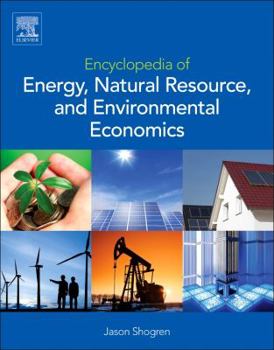Encyclopedia of Energy, Natural Resource, and Environmental Economics
Select Format
Select Condition 
Book Overview
Every decision about energy involves its price and cost. The price of gasoline and the cost of buying from foreign producers; the price of nuclear and hydroelectricity and the costs to our ecosystems; the price of electricity from coal-fired plants and the cost to the atmosphere. Giving life to inventions, lifestyle changes, geopolitical shifts, and things in-between, energy economics is of high interest to Academia, Corporations and Governments. For economists, energy economics is one of three subdisciplines which, taken together, compose an economic approach to the exploitation and preservation of natural resources: energy economics, which focuses on energy-related subjects such as renewable energy, hydropower, nuclear power, and the political economy of energy resource economics, which covers subjects in land and water use, such as mining, fisheries, agriculture, and forests environmental economics, which takes a broader view of natural resources through economic concepts such as risk, valuation, regulation, and distribution Although the three are closely related, they are not often presented as an integrated whole. This Encyclopedia has done just that by unifying these fields into a high-quality and unique overview.
Format:Unknown Binding
Language:English
ISBN:B06XB9VMQH
ISBN13:9780123750679
Release Date:May 2013
Publisher:Elsevier Science & Technology
Length:1056 Pages
Related Subjects
Engineering Reference Science Science & Math Science & Scientists Science & Technology TechnologyCustomer Reviews
0 rating





